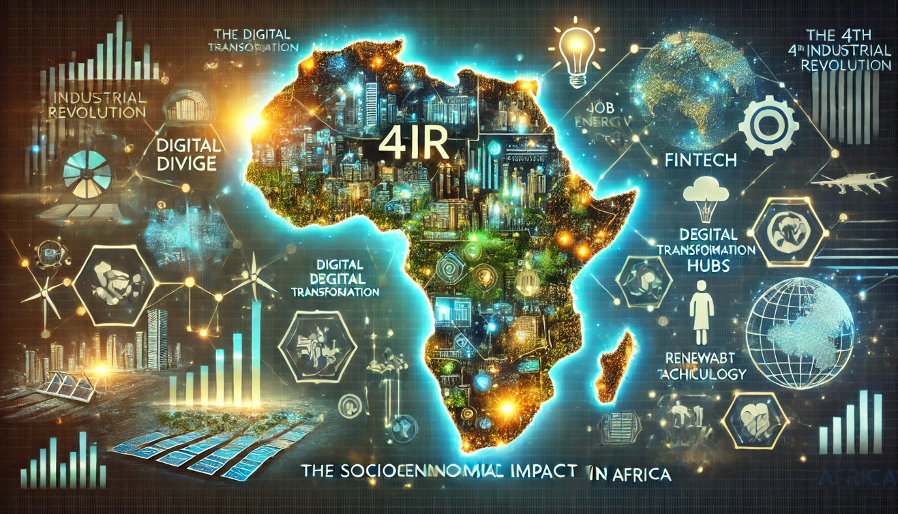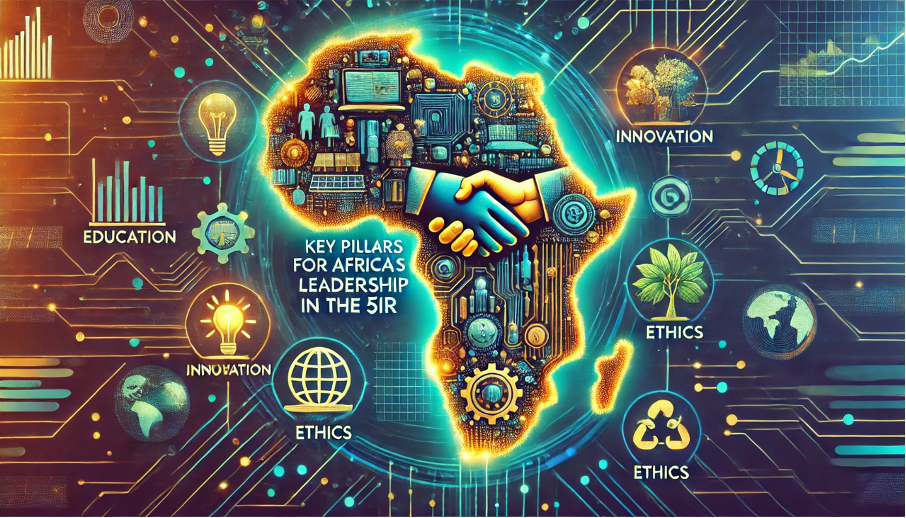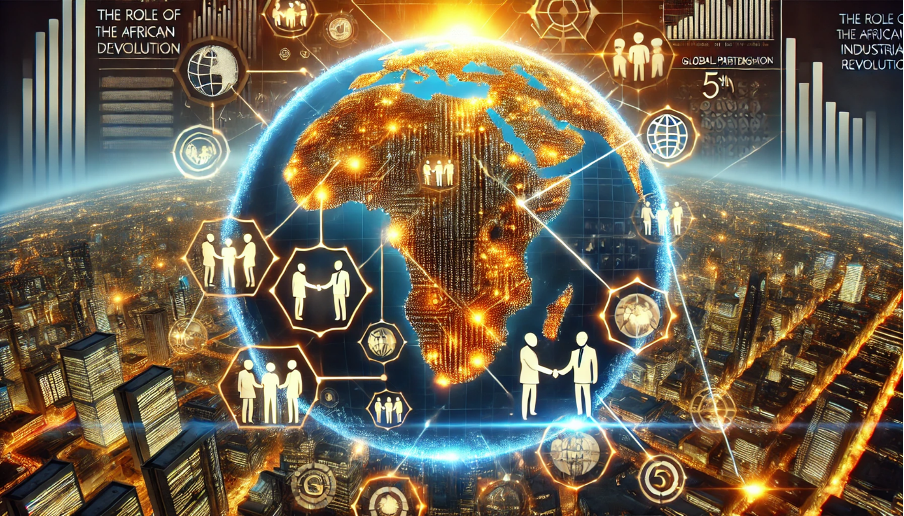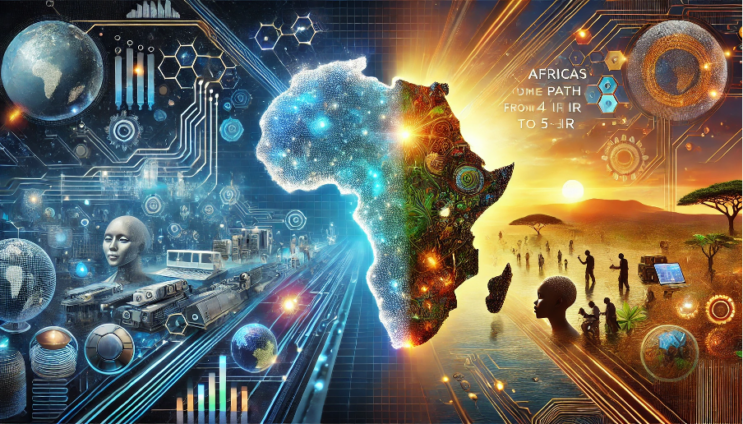"The future is already here—it’s just not evenly distributed." – William Gibson.
In today’s rapidly evolving world, the 4th Industrial Revolution (4IR) is transforming how we live, work, and interact, driven by technologies like Artificial Intelligence (AI), Big Data, the Internet of Things (IoT), and robotics. Yet, as automation and machine intelligence reshape industries, the emerging 5th Industrial Revolution (5IR) calls for a more profound shift—one that prioritises human-centric innovation, ethics, and sustainability. For Africa, this transition offers not just a challenge but a once-in-a-century opportunity to lead. The 4IR has been dubbed the "automation era," emphasizing smart systems, autonomous machines, and data-driven decision-making.
By 2030, it is estimated that over 97 million jobs will be created globally through roles in AI, data science, cloud computing, and IoT. However, this surge comes at a cost: automation is projected to displace 85 million jobs by 2025, disproportionately affecting labour-intensive economies, many of which are in Africa. These figures highlight the need for proactive measures to prepare workforces for emerging demands.
Unlike its predecessor, the 5IR reintroduces humanity into the equation. It champions collaboration between humans and intelligent systems to design technologies that solve not just economic problems but also societal and environmental challenges. In the 5IR, innovation moves beyond efficiency to empathy, with industries incorporating ethical AI, sustainable production methods, and job-creating green technologies.
For Africa, where 60% of the population is under 25 years old, the potential to shape this future is immense. The continent’s youthful demographic is not only its greatest resource but also a critical factor in positioning Africa as a leader in 5IR-driven industries. The stakes are high. While Africa is home to some of the world’s fastest-growing tech ecosystems, it also grapples with deep-seated challenges, including a 47% digital connectivity gap and limited access to emerging technologies. Bridging these gaps is essential to ensuring that Africa’s transition from the 4IR to the 5IR is both inclusive and transformative. The 4IR may have introduced Africa to the digital age, but the 5IR offers the continent a chance to redefine its role in the global economy—not just as a participant but as a leader. Through strategic investments in education, innovation, and sustainability, Africa can become the blueprint for how to harmonize digital and human intellect in a way that benefits all.
Understanding the 4IR and 5IR
The 4th Industrial Revolution (4IR) represents a significant turning point in human history, defined by groundbreaking advancements in technology. At its core, the 4IR leverages artificial intelligence (AI), the Internet of Things (IoT), robotics, blockchain, and Big Data to create an era dominated by automation. Tasks that were once manual or repetitive are now being performed by intelligent systems capable of learning and improving over time. This revolution has introduced innovations such as self-driving vehicles, predictive healthcare systems, and smart industrial processes, reshaping global industries at an unprecedented pace. The economic implications of the 4IR are staggering.
The World Economic Forum predicts that by 2030, technologies associated with the 4IR will generate approximately 97 million new roles globally, including positions in data science, cloud computing, and AI development. However, these advancements come with challenges. Automation alone is expected to displace 85 million traditional jobs by 2025, particularly in labour-intensive sectors like manufacturing and administration. For African economies, where industries such as agriculture and mining dominate, these changes present a dual-edged sword—an opportunity to modernise, but also a risk of leaving millions unprepared for the future.

The 5th Industrial Revolution (5IR) is emerging as a response to the challenges posed by the 4IR. While the 4IR focuses on efficiency and automation, the 5IR seeks to reintroduce humanity into technological progress. It emphasizes human-centric innovation, combining AI's power with human creativity, empathy, and ethical considerations. The 5IR envisions a future where humans and machines collaborate to tackle global challenges such as climate change, healthcare access, and economic inequality. It is not merely about producing more but about producing better, with solutions that prioritize inclusivity, sustainability, and personalized needs. For instance, technologies like ethical AI are being designed to respect diversity and fairness, while sustainable manufacturing methods aim to minimize environmental damage. Innovations such as AI-assisted drug discovery tailored to specific populations or renewable energy solutions designed for marginalized communities reflect the ethos of the 5IR. These advancements demonstrate how the revolution moves beyond technical efficiency, placing human welfare and the planet at its core.
Africa holds immense potential to thrive in this transformative era, thanks to its demographic advantage and natural resource wealth. With a median age of 19.7 years, Africa boasts the youngest population in the world. This digitally curious and entrepreneurial demographic provides a strong foundation for innovation. Additionally, the continent is rich in critical resources such as cobalt, which powers batteries for electric vehicles and renewable energy systems. The Democratic Republic of Congo alone accounts for over 70% of the global supply of cobalt, positioning Africa as a key player in the global technology value chain.
Unlike the 4IR, where Africa has primarily been a consumer of imported technologies, the 5IR presents an opportunity for the continent to become a creator of globally impactful solutions. African innovators are uniquely positioned to design technologies that address both local and global challenges. However, realizing this potential requires significant investments in education, infrastructure, and research and development. In prioritizing these areas, Africa can transition from being a passive participant in technological revolutions to leading the charge in shaping the future.
The Socioeconomic Impact of 4IR in Africa
The 4th Industrial Revolution (4IR) is reshaping the global economy, bringing profound changes to the way industries operate and how wealth is created. Globally, the digital economy is projected to reach a value of $24.3 trillion by 2025, accounting for nearly 25% of global GDP (World Economic Forum, 2023). For Africa, where industrialization has historically lagged, the 4IR presents both a challenge and an unparalleled opportunity to leapfrog traditional development trajectories and redefine its role in the global economy.
Countries like Kenya, South Africa, Ghana, and Nigeria have emerged as key players in Africa’s digital transformation. For example, Ghana’s growing fintech sector has grown exponentially, contributing over $400 million annually to the economy as startups like Zeepay and ExpressPay attract global attention. Similarly, Nigeria’s tech ecosystem, led by unicorns like Flutterwave and Paystack, has attracted billions in foreign investment, including a $200 million acquisition by Stripe (Statista, 2023). Kenya’s M-Pesa mobile money system continues to drive financial inclusion, with over 50 million users across the continent and annual transactions exceeding $300 billion (Safaricom, 2023). These success stories underscore the transformative potential of the 4IR across the continent.

However, alongside these advancements, the 4IR has introduced significant disruptions. Automation is expected to displace up to 85 million jobs globally by 2025, with Africa projected to lose 13 million jobs in sectors like manufacturing, agriculture, and mining (International Labour Organization, 2023). In Ghana, for instance, mining remains a key contributor to GDP, employing over 1 million workers directly and indirectly. The rise of autonomous mining equipment threatens to displace many of these jobs unless proactive measures are taken to reskill workers.
Despite these challenges, the 4IR is also a powerful engine of job creation. The digital economy in Africa is forecasted to generate over 6 million new jobs by 2030, particularly in IT services, renewable energy, and e-commerce (World Bank, 2023). Ghana, for example, has seen a surge in employment opportunities in the renewable energy sector, with initiatives like the Scaling Solar program creating hundreds of jobs while enhancing energy access for rural communities. South Africa, which has invested heavily in solar and wind energy, has already generated 250,000 green jobs, with more anticipated as the sector expands (IRENA, 2023).
Another critical concern is the digital divide, which remains a significant barrier to inclusive growth. As of 2023, only 47% of Africans have access to the internet, compared to the global average of 66% (ITU, 2023). In Ghana, internet penetration is higher at 58%, thanks to government initiatives like the National Broadband Policy, but rural areas still lag far behind. Without concerted efforts to improve connectivity, millions of Africans risk being left out of the digital revolution.
The 4IR also highlights the need for economic diversification across the continent. Overreliance on raw material exports has left many African countries vulnerable to market fluctuations. Through leveraging 4IR technologies, nations can create more resilient economies. Ghana’s agritech startups, such as Esoko and Farmerline, are excellent examples of this, using AI and IoT to optimize agricultural productivity and link farmers to markets. Similarly, Nigeria’s agritech innovations like Farmcrowdy have boosted food security and created jobs for thousands of rural workers.
The emerging 5IR offers a path to address the challenges of the 4IR while enhancing its benefits. Through emphasizing human-centric innovation, inclusivity, and sustainability, the 5IR aims to redefine the future of work. For example, while automation may displace millions of jobs, human-AI collaboration under the 5IR will create new roles that blend technical expertise with creativity and ethical judgment. This is particularly critical for Africa, where cultural diversity and human ingenuity can drive the creation of globally impactful solutions. Africa’s ability to harness the opportunities of the 4IR and transition seamlessly to the 5IR will depend on strategic investments in education, infrastructure, and policy reform. Bridging the digital divide, fostering innovation, and ensuring that growth is inclusive are essential steps in positioning Africa, and countries like Ghana, as leaders in this new industrial era.
Key Pillars for Africa’s Leadership in the 5IR
As the world shifts from the automation-driven 4th Industrial Revolution (4IR) to the human-centric 5th Industrial Revolution (5IR), Africa is uniquely positioned to lead this transformative era. The continent’s youthful population, natural resource wealth, and growing tech ecosystems provide a strong foundation. However, to capitalize on these advantages, Africa must prioritize key pillars that align with the 5IR’s focus on inclusivity, ethics, and sustainability.

- Education and Workforce Development
Education remains the cornerstone of Africa’s transition to the 5IR. While the 4IR has created demand for tech-savvy professionals, the 5IR emphasizes a blend of technical expertise and human-centric skills such as creativity, problem-solving, and ethical decision-making. Currently, Africa faces a significant skills gap, with the African Development Bank estimating that only 10% of African students graduate in STEM fields. Countries like Ghana are taking steps to address this gap through initiatives such as the Digital Skills for Jobs Project, which aims to train 1 million youth in digital skills by 2030. To lead in the 5IR, African nations must integrate interdisciplinary curricula into their education systems, focusing on fields such as AI ethics, green technology, and bio-innovation. Additionally, partnerships with global tech leaders can provide access to advanced training and resources, ensuring that Africa’s workforce is prepared for emerging roles.
b. Technological Innovation and Research and Development (R&D)
Innovation will be a key driver of Africa’s leadership in the 5IR. While the 4IR saw Africa adopting technologies developed elsewhere, the 5IR provided an opportunity to shift from consumption to creation. R&D investments are critical to achieving this. However, Africa currently spends an average of only 0.42% of its GDP on R&D, compared to the global average of 1.7% (UNESCO, 2023). To bridge this gap, countries like South Africa and Kenya have established innovation hubs and research centers focused on developing solutions tailored to local challenges. Ghana’s collaboration with universities and private firms to establish AI research labs is a step in the right direction. Scaling such initiatives across the continent will enable Africa to produce groundbreaking technologies in sectors like healthcare, renewable energy, and agritech.
c. Ethics and Inclusivity
The 5IR emphasizes the ethical application of technology, ensuring that innovations benefit all segments of society. Africa has the opportunity to lead in this area by setting global standards for ethical AI and human-AI collaboration. This includes addressing biases in algorithms, ensuring equitable access to technology, and protecting data privacy. Inclusivity is equally critical. With 47% of Africans still offline (ITU, 2023), efforts to bridge the digital divide must be prioritized. Countries like Ghana and Rwanda are leading by example through initiatives that expand rural broadband access and provide affordable digital devices. Ensuring that underserved communities are included in the technological revolution will not only foster equity but also unlock untapped potential.
Policy and Strategic Interventions
Africa’s journey from the 4th Industrial Revolution (4IR) to the human-centric 5th Industrial Revolution (5IR) requires bold policies and strategic interventions. While the continent has made significant progress in leveraging technology for economic growth, realizing the full potential of the 5IR demands a deliberate focus on inclusivity, sustainability, and innovation. Governments, businesses, and civil society must work collaboratively to implement the following key strategies.
- Building Digital Infrastructure
Access to digital infrastructure remains a critical barrier for many Africans. While internet penetration has reached 47% across the continent, this figure lags behind the global average of 66% (International Telecommunication Union, 2023). Closing this gap is essential for ensuring that all citizens can benefit from digital innovations. Investments in broadband expansion, particularly in rural areas, are vital. Ghana’s National Broadband Policy, for example, has successfully increased internet penetration to 58%, a model that other nations can emulate. In prioritizing affordable internet access and supporting public-private partnerships, Africa can lay the groundwork for widespread participation in the 5IR.
b. Reshaping Education Systems
Africa’s education systems must evolve to prepare citizens for the hybrid roles that will emerge in the 5IR. Traditional curricula focused solely on STEM fields are no longer sufficient. Instead, interdisciplinary programs that integrate technical skills with creativity, ethics, and problem-solving are needed. For instance, Rwanda’s partnership with Carnegie Mellon University to establish an African-focused AI program is a step in the right direction. Moreover, skilling initiatives targeting women and youth are crucial. As of 2023, only 35% of African women are employed in the tech sector, highlighting the need for gender-inclusive education policies (UN Women, 2023). Scholarships, mentorship programs, and tech boot camps can address these disparities while creating a more equitable workforce.
c. Encouraging Research and Development (R&D)
Africa spends just 0.42% of its GDP on R&D, compared to the global average of 1.7% (UNESCO, 2023). Increasing funding for research is essential for fostering innovation. Governments must incentivize private-sector investment in R&D through tax breaks, grants, and intellectual property protections. South Africa’s Innovation Fund, which supports startups in AI, renewable energy, and biotechnology, is an example of how targeted investments can drive progress. Expanding similar programs across the continent will enable Africa to transition from technology consumer to creator, aligning with the collaborative ethos of the 5IR.
d. Strengthening Governance and Ethics
As the 5IR emphasizes human-centric technology, ethical governance must be a priority. Policies regulating AI usage, data privacy, and algorithmic transparency are essential for building trust and ensuring equitable outcomes. For example, Kenya’s draft Data Protection Act, modelled after Europe’s GDPR, sets a precedent for protecting citizens’ digital rights. Additionally, addressing corruption and bureaucratic inefficiencies can create a more favourable environment for innovation. Transparent governance frameworks will attract foreign investment and ensure that resources are allocated effectively.
e. Scaling Renewable Energy and Green Initiatives
Sustainability is a cornerstone of the 5IR, and Africa has the potential to become a global leader in renewable energy. With abundant solar, wind, and geothermal resources, the continent can drive green growth while reducing reliance on fossil fuels. By 2030, Africa’s renewable energy sector is projected to create 12 million jobs (IRENA, 2023). Programs like Ghana’s Scaling Solar Initiative and South Africa’s Renewable Energy Independent Power Producer Procurement Program (REIPPPP) demonstrate how green technologies can stimulate job creation and economic resilience. Expanding these initiatives and integrating them into national development plans will position Africa as a global hub for sustainable innovation.
f. Leveraging Pan-African Collaboration
The African Continental Free Trade Area (AfCFTA) offers a platform for harmonized policies and cross-border collaboration in technology development, education, and trade. In creating unified digital economies, AfCFTA can facilitate the scaling of innovations across the continent. For example, standardizing regulations for AI and fintech can enhance market access for African startups, fostering growth and competition. Additionally, regional innovation hubs can serve as centres of excellence, driving research and knowledge exchange. For instance, an AI hub in East Africa could complement a renewable energy research centre in West Africa, creating a network of expertise.
g. Engaging the Diaspora and Global Partners
The African diaspora plays a crucial role in driving the 5IR transition. Diaspora professionals contribute expertise, capital, and networks, enabling Africa to compete on the global stage. Initiatives like Ghana’s Year of Return have demonstrated the economic potential of engaging the diaspora, generating over $3 billion in 2019 (Ghana Ministry of Tourism, 2020). Global partnerships are equally vital. Collaborating with international organizations and technology leaders can provide access to funding, infrastructure, and best practices. For example, Rwanda’s partnership with Zipline to deliver medical supplies via drones showcases the power of leveraging global expertise to address local challenges. In implementing these strategic interventions, Africa can bridge the gap between the 4IR and 5IR, positioning itself as a global leader in inclusive and sustainable innovation. The continent has the resources, talent, and determination needed to define the future of the 5IR—not just for Africa, but for the world.
h. Sustainability and Green Technology
Sustainability is a defining feature of the 5IR, and Africa is well-positioned to lead the global transition to green technologies. The continent has abundant natural resources to support renewable energy projects, such as solar, wind, and geothermal power. For example, Ghana’s Scaling Solar initiative has added 500 megawatts of clean energy to the grid, creating jobs and reducing carbon emissions. Similarly, South Africa’s investment in renewable energy has positioned it as a leader in green jobs, with the sector employing over 250,000 people (IRENA, 2023). Expanding these efforts across the continent can not only drive economic growth but also position Africa as a global hub for sustainable innovation.
i. Pan-African Collaboration and Policy Reform
The African Continental Free Trade Area (AfCFTA) provides a platform for unified action across the continent. Through harmonizing policies and regulations, African nations can foster cross-border collaboration in technology development, education, and trade. Additionally, policy reforms are needed to attract investments and create an enabling environment for innovation. Simplifying business registration processes, protecting intellectual property, and incentivizing startups are essential steps.
j. Strategic Partnerships with the Diaspora and Global Actors
The African diaspora represents a valuable resource in the 5IR transition. Diaspora professionals bring expertise, capital, and networks that can accelerate innovation on the continent. For instance, Ghana’s Year of Return initiative, which encouraged diaspora engagement, generated over $3 billion in economic activity in 2019. Building on such initiatives, Africa can tap into its global talent pool to drive 5IR advancements. Collaborating with international actors is equally critical. Partnerships with global organizations and technology leaders can provide access to funding, infrastructure, and best practices, enabling Africa to compete on the global stage. In focusing on these pillars, Africa can not only transition seamlessly from the 4IR to the 5IR but also redefine global narratives about innovation and leadership. The continent has the resources, talent, and vision needed to lead this new era—what remains is the commitment to act decisively and inclusively.
The Role of the Diaspora and Global Partnerships
The African diaspora and global partnerships are instrumental in shaping the continent’s transition from the 4th Industrial Revolution (4IR) to the human-centric 5th Industrial Revolution (5IR). These stakeholders offer not only expertise and capital but also access to networks and technological innovations that can accelerate Africa’s integration into the global knowledge economy.

- Harnessing Diaspora Expertise
Africa’s diaspora, estimated at over 170 million people worldwide, represents a wealth of knowledge and skills across various industries, including technology, finance, healthcare, and education. With $95.6 billion in remittances sent to Africa in 2022 (World Bank, 2023), the diaspora is already a significant economic force. However, beyond financial contributions, their intellectual capital is critical for driving the 5IR agenda. One example of diaspora-driven innovation is Andela, a company founded by Nigerians and supported by global investors to train African software developers for global markets. By fostering similar initiatives, African nations can leverage their diaspora’s expertise to build domestic capacity in AI, renewable energy, and biotechnology—key sectors of the 5IR. Targeted policies, such as streamlined investment procedures and incentives for diaspora professionals to return home or invest remotely, can further encourage their participation. Ghana’s Year of Return initiative successfully demonstrated how cultural and economic engagement with the diaspora can yield transformative results, generating not just tourism revenue but also investments in real estate, technology, and infrastructure.
b. Global Collaborations for Technology Transfer
Global partnerships provide access to cutting-edge technologies and knowledge transfer, which are essential for Africa’s leadership in the 5IR. For example, partnerships between African governments and global tech companies like Google, Microsoft, and Huawei have resulted in training programs, innovation hubs, and infrastructure projects that bridge critical gaps in skills and connectivity. A notable success story is Rwanda’s collaboration with Carnegie Mellon University to establish the African Institute for Mathematical Sciences, focusing on AI and data science. This partnership has produced highly skilled graduates who are contributing to solving Africa’s unique challenges, such as improving healthcare delivery through predictive analytics. In addition, partnerships in renewable energy, such as South Africa’s cooperation with Denmark on wind energy projects, have facilitated the adoption of advanced technologies and created sustainable jobs. Expanding such collaborations to include circular economy projects—like recycling electronic waste into valuable materials—can ensure that Africa benefits from environmentally responsible industrialization.
c. Driving Investment Through Strategic Alliances
Strategic alliances with international financial institutions and development organizations can unlock significant funding for Africa’s 5IR initiatives. Institutions like the African Development Bank (AfDB) and the World Bank have already committed billions to projects in renewable energy, digital transformation, and infrastructure development.For instance, the AfDB’s Desert to Power Initiative aims to provide solar energy to 250 million people in the Sahel region, transforming it into a renewable energy powerhouse. In forging partnerships with private sector investors, Africa can scale such projects and position itself as a global leader in sustainable energy solutions. Collaborations with philanthropic organizations, such as the Bill and Melinda Gates Foundation, can also support the ethical application of AI and biotechnology. Funding research in these areas ensures that Africa is not just a consumer but also a creator of human-centric technologies tailored to local needs.
d. Knowledge Sharing Through International Networks
Global forums and networks offer opportunities for African policymakers, researchers, and entrepreneurs to engage with peers worldwide, exchanging ideas and best practices. Africa’s participation in initiatives like the Global Partnership on Artificial Intelligence (GPAI) enables the continent to influence global standards on ethical AI and ensure that its unique perspectives are represented. Moreover, regional collaborations within Africa itself, supported by global networks, can amplify impact. For example, the African Continental Free Trade Area (AfCFTA) can serve as a platform for cross-border knowledge sharing and technology transfer, supported by international partners.
e. A Global Stage for African Innovation
The 5IR provides an opportunity for Africa to not only adopt global innovations but also export its own solutions. Technologies developed to address African challenges, such as mobile money and drone-based medical deliveries, have already gained international recognition. By scaling these innovations, Africa can redefine its role in the global economy—not as a recipient of aid but as a provider of solutions. To fully harness the diaspora and global partnerships, African governments must prioritize frameworks that encourage collaboration while ensuring that local communities benefit equitably. Transparent governance, fair distribution of resources, and alignment with the 5IR’s human-centric principles will ensure sustainable progress.
Conclusion
Africa stands at a critical crossroads, uniquely positioned to redefine its role in the global economy as the world transitions from the automation-driven 4th Industrial Revolution (4IR) to the human-centric 5th Industrial Revolution (5IR). With a youthful population, abundant natural resources, and burgeoning tech ecosystems, the continent has the raw ingredients to lead this transformative era. However, the realization of this potential depends on deliberate and strategic action. The 4IR has already shown Africa’s capacity for innovation, with breakthroughs in fintech, renewable energy, and agritech transforming industries and improving lives. Yet, the same revolution has exposed vulnerabilities, such as the digital divide, workforce displacement, and limited access to infrastructure. The 5IR offers a chance to address these gaps, emphasizing inclusivity, sustainability, and the ethical application of technology.
Africa’s journey to 5IR leadership must be anchored in key pillars: investing in education that prepares a hybrid workforce, fostering research and development to drive local innovation, and adopting policies that ensure equitable growth. By leveraging the power of its diaspora, forming strategic global partnerships, and championing regional collaboration through frameworks like the AfCFTA, Africa can emerge as a leader in shaping the future of work, technology, and sustainability. This path is not without challenges. Achieving widespread digital access, bridging skill gaps, and fostering ethical governance requires sustained commitment from governments, businesses, and civil society. Yet, these challenges are also opportunities to define a uniquely African approach to industrialization—one that harmonizes human and technological advancement while addressing global challenges like climate change and inequality.
Africa’s destiny in the 5IR era is not just about catching up; it is about leading. By embracing its cultural diversity, entrepreneurial spirit, and resilience, the continent can set a global example of how to balance progress with purpose. As the world looks for solutions that prioritize humanity over mere efficiency, Africa’s vision for a sustainable, inclusive, and ethical future can light the way. The time to act is now. The 5IR offers Africa not just a seat at the table but the opportunity to shape the table itself—building a future where technology serves humanity and prosperity is shared by all.
******

Dr. David King Boison, Senior Research Fellow at the Center for International Maritime Affairs Ghana (CIMAG), is a distinguished academic, consultant, and CEO of Knowledge Web Centre, specialising in Blue Economy, Maritime and Port Operations & Logistics, IT, supply chain management, and Artificial Intelligence. With dual PhDs in Port Operations and Business Administration and two MSc degrees with distinction from Coventry University, he is the Lead Consultant for the Ai Africa Project, which aims to train 11 million Africans in AI technologies. A Senior Visiting Lecturer at Wigwe University, Rivers State, Nigeria, he is also recognized for pioneering Ghana's e-port system (now the Paperless Port System). He has authored numerous peer-reviewed papers and white papers on the Blue Economy, maritime trade & Port Operations, AI, fintech, and digital currencies, and has written two books.
Latest Stories
-
Fitch affirms UBA Ghana’s Credit Rating at ‘B-’, citing strong profitability and capital buffers
1 hour -
‘SafeCare is Changing Lives’: Gradually redefining quality care in Ghana
2 hours -
NSA Director General graces Teqball National Club Championship, calls for corporate support
2 hours -
Novo Nordisk and American Society of Hematology announce new initiative to help improve sickle cell disease care in Africa
2 hours -
Telecel Ghana rewards 12th Dream Car Promo Winner with brand-new Hyundai Creta
2 hours -
No vigilante group can defy a determined police – CDD Ghana’s Dr Kojo Asante
2 hours -
Grow For Me: Transforming Agriculture through mobile investment
3 hours -
Musk’s Grok signs $200m deal with Pentagon days after antisemitism row
3 hours -
10 Chinese nationals denied bail in gold case
3 hours -
Work-and-pay driver remanded for car theft
3 hours -
Man arrested for allegedly stealing prepaid meters
3 hours -
South African car exports to U.S. plunge as Trump tariffs bite
4 hours -
Cameroon’s Biya, 92, brushes off health fears in bid for new term
4 hours -
Teddy bear made from fake human skin leads to California arrest
4 hours -
Beyoncé’s unreleased music stolen from car during Cowboy Carter tour
4 hours

